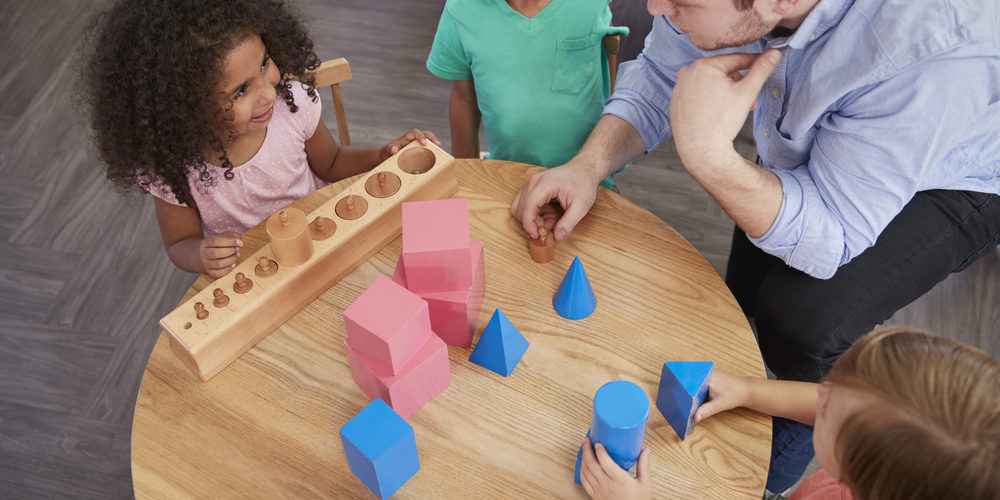Choosing the correct educational path for your child is important, as the environment and quality of education can help shape their future. You want only the best—for your child to be successful. Fortunately, there are plenty of options out there beyond traditional schooling, such as Montessori. Knowing more about what happens inside the Montessori classroom, as well as what children are taught, can help you decide. So here is the inside scoop on Montessori schools.
What is a Montessori Education?
Montessori goes against the grain of traditional education. The system is designed to inspire children to strengthen their natural interests and passions from a young age. Rather than requiring hours spent listening to a lecture from a teacher, the children are guided towards tasks and encouraged to be individuals.
The learning tools in a Montessori classroom, as well as the environment, are designed in such a way to promote curiosity, creativity, cooperation, movement, and social interaction. There are no tests, no letter grades, and no competition, as rewards and punishments are not given. Instead, children learn how to dissolve conflicts peacefully, to monitor and regulate their own emotions, and to seek out assistance when needed.
Montessori education has been lauded for providing a complete education. Beyond academia, children also master practical life and social skills.
What You Find in a Montessori School or Classroom
Here are some of the most defining aspects of Montessori:
- Minimal chaos. When you look in on a Montessori classroom, you will see children working quietly and calmly. It does not look anything like the kindergarten or elementary school you know. There is no chaos, despite children having Freedom Within Limits.
- Cleanliness and neatness. One of the Montessori principles—Prepared Environment—means that children can enjoy an open, clean, and organized classroom. Everything in the room is child-sized, accessible, and neat. This teaches children the fundamental principle of keeping everything organized and returning items back to their proper place when they are done using something.
- Independence. Children can work and play together or alone. They are also given the freedom to tend to their own needs, such as cleaning up after themselves, preparing a snack, or selecting which task they would like to focus on.
- Montessori materials. Montessori classrooms contain all kinds of Montessori-specific materials made from wood, metal, and fabric. Nothing artificial here! Plus, the tools are designed to teach specific skills, from unbuttoning a shirt to sewing, counting, decimals, reading, and more.
- Longer, uninterrupted work periods. For young children, Montessori programs consist of work periods that are 1-3 hours long. This provides the students a chance to focus on their work and gain a deeper understanding of the tasks before them. Older children in Montessori programs may use this time for independent research and projects.
- Mixed ages. Classrooms are grouped based on a child’s age. At Fishtown Montessori, there are toddler classrooms for children up to 3 years old. Then the primary classroom is between 3-6 years old.
What to Look For in a Montessori School
If you are trying to decide between several Montessori schools, look for the one with Montessori-certified teachers and programs from either the American Montessori Society (AMS) or Association Montessori Internationale (AMI).
Be sure to visit the school, meet the teachers, and look at the curriculum. Montessori schools are varied, and some of them may meet your child’s needs better than others.
Is Montessori Right For Your Child?
Montessori schools are ideal for children who enjoy self-directed work and do not mind working on their own for periods of time. Furthermore, the calming environment is perfect for children who struggle with sensory overload. They will not be overwhelmed by disorder and noise in a Montessori classroom.
Children gain new skills and self-esteem. This is because they can work at their own pace. They don’t feel any competition or pressure to be like their peers. The teachers also encourage independence, and they rarely interfere with what the children do.
However, Montessori is not a perfect match for every child. It is highly recommended that you attend a tour to see if the Montessori program is a good fit for them.
Looking For a Montessori School in Philadelphia?
Hopefully, this inside scoop on Montessori schools has helped answer some of your questions. Certified Montessori schools are incredible environments for all kinds of children. If you want your child to gain independence, self-confidence, and practical life skills that are no longer taught in traditional schools, Montessori may be right for you.
Why not see if Fishtown Montessori is a match for your child? Our carefully curated curriculum supports the development of every child, and our peaceful environment is full of healthy challenges and tasks. We invite you to sign up for a virtual tour today to see our classrooms and meet our wonderful teachers.






